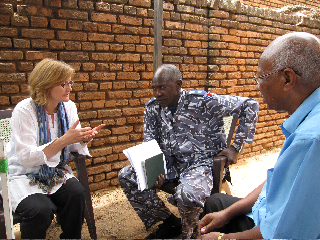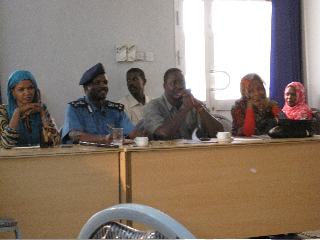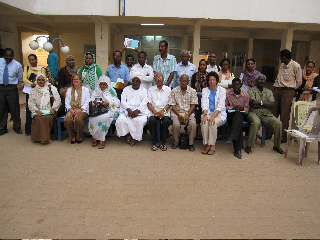ETC/I Senior Program Officers Jacqueline Wilson and Linda Bishai and Center for Mediation and Conflict Resolution Program Officer, Jon Temin, conducted a short-form electoral violence prevention consultation in Khartoum with high-level political party representatives, journalists, academics and civil society leaders. This program included the four voter-education theatre vignettes by Mohammed Sharif and his troupe.
April 24-25, 2009 - Khartoum
ETC/I Senior Program Officers Jacqueline Wilson and Linda Bishai and Center for Mediation and Conflict Resolution Program Officer, Jon Temin, conducted a short-form electoral violence prevention consultation in Khartoum with high-level political party representatives, journalists, academics and civil society leaders. This program included the four voter-education theatre vignettes by Mohammed Sharif and his troupe. Participants were very taken with the play and Mr. Sharif’s guided discussion of election issues. They expressed the conviction that the play could do far more to educate the Sudanese population about election issues than formal training programs. At the end of the program the participants summarized the lessons learned from the case studies for the case of Sudan and committed themselves to furthering knowledge of those lessons within their own institutions. Several of the participants also committed themselves to drafting a code of conduct for political parties and civil society institutions to help prevent violence during the election period. USIP local partner, the Institute for the Development of Civil Society, will do follow-up on this code of conduct.

April 27-29, 2009 - Dilling
Following the Khartoum EVP consultation, USIP staff traveled to the town of Dilling in South Kordofan to provide the full EVP program at the office of local partner and grantee, the Badya Center. The workshop was oversubscribed, with about 60 participants squeezing into the outdoor courtyard of the Center. They included local government administrators, tribal leaders, students and youth leaders, party representatives and women’s group leaders as well as journalists. As with other audiences, this group expressed great appreciation, interest and commitment for the topic of election violence prevention. The speaker from the South Kordofan police, Lt. Col. Mohammed Khafi Abdullah, gave a clear presentation on the plans and concerns of the police to secure the elections. 
The willingness of the Lt. Col. to stay and answer numerous questions was a positive indicator of future possibilities for establishing cooperative relations between the police and civil society. As in Khartoum, participants in the Dilling program were pressed to apply the lessons learned from the case studies to the upcoming elections in Sudan. They worked in small groups representing five key institutional actors in Sudan, including civil society, media, armed forces (including police), political parties, and the National Election Commission (including the judiciary). The five groups came up with positive and negative roles these institutions could play and ended with personal commitments by the participants to raise awareness, form alliances committed to nonviolence, and to train the political parties in preventing election violence.



